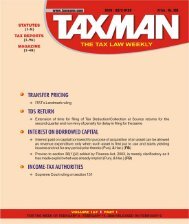news round up - Taxmann
news round up - Taxmann
news round up - Taxmann
- TAGS
- news
- round
- taxmann
- taxmann.com
Create successful ePaper yourself
Turn your PDF publications into a flip-book with our unique Google optimized e-Paper software.
2010] Tropical Flavours (P.) Ltd. v. State of Karnataka (Kar.) 215<br />
A<br />
B<br />
C<br />
D<br />
E<br />
F<br />
G<br />
dry chillies by bringing within the ambit of said dry chillies, the cut chillies,<br />
spent chillies and chilly seeds within the fold of dry chillies.<br />
11. The question that requires to be examined in the instant case is :<br />
“by virtue of the extraction process, whether the reminiscence of the dry chilly<br />
can be sold as a product or commodity independently and is accepted in<br />
common parlance as such?”<br />
The process carried out for extraction of oleoresin results in the parts of<br />
dry chilly and in trade parlance it is called as skinned/cut chilly or crushed<br />
chilly or spent chilly. The crushed chilly consists of stem, a part of the skin<br />
and the chilly seeds. This extracted chilly can be used as a product is not<br />
disputed by the Revenue. The only g<strong>round</strong> on which the Revenue is<br />
attempting to contend is that, the reminiscence of the extracted chilly<br />
would attract the residuary clause is by virtue of non-inclusion of these<br />
products viz., cut chilly, crushed chilly, and spent chilly in Entry No. 61 for<br />
the relevant period. When the said product can be sold as such in the<br />
market and it is accepted as such in common trade parlance, we are<br />
unable to accept the contention of the Revenue that though it partakes the<br />
character of different commodity, only by virtue of its non-inclusion in the<br />
entry at Sl.No. 61, it cannot be held that residuary clause gets attracted. In<br />
this regard, the judgment of this Court in the case of Habeeb Proteins & Fats<br />
Extracts (s<strong>up</strong>ra) requires to be extracted which reads as follows :—<br />
“26. Secondly, the learned counsels for the parties have not placed any<br />
material before us to demonstrate how the sunflower oil cake and g<strong>round</strong>nut<br />
oil cake are in any way different from de-oiled sunflower cake and g<strong>round</strong>nut<br />
oil cake. Therefore, the only way we need to understand these commodities<br />
is the way in which they are understood in common parlance and in trade<br />
circles. The oil cake contains a certain percentage of oil and several other<br />
ingredients. When these commodities are subjected to processing of extraction<br />
of oil, some quantum of oil is removed, but they continue to remain as oil cakes<br />
with lesser content of oil, and the original commodity is not used in the<br />
manner as to cease to exist or cease to be available in that form for sale or<br />
purchase to attract levy of tax under section 6 of the Act. An article which is<br />
commonly and generally known as oil cake would not lose its identity merely<br />
because the purchasing dealer utilises the same for extraction of oil and<br />
therefore, the essential ingredients required to attract the levy of purchase tax<br />
under section 6 of the Act are not satisfied and accordingly it requires to be<br />
held that there is no consumption of oiled sunflower cake and oiled g<strong>round</strong>nut<br />
oil cake in the manufacture of other goods for sale nor there is any consumption<br />
otherwise, since even after extraction of oil, the oiled sunflower cake and oiled<br />
g<strong>round</strong>nut oil cake continue to remain as oil cake with lesser quantity of oil<br />
and therefore, they continue to remain the same commodity.”<br />
13. This Court while considering as to character of de-oiled cakes remaining<br />
after extraction from oil cake held that, it does not lose its identity as<br />
whole cake nor it ceases to exist as an oil cake. Applying the proposition laid<br />
down in the said judgment which is pressed into service by the appellant<br />
to the facts of this case, the only way to understand the commodities which<br />
ultimately comes out on crushing of the chilly in common parlance and in<br />
GOODS & SERVICES TAX CASES ❑ JANUARY 20 - FEBRUARY 4, 2010 ◆ 91











![“FORM NO. 3CEB [See rule 10E] Report from an ... - Taxmann](https://img.yumpu.com/45480232/1/190x245/form-no-3ceb-see-rule-10e-report-from-an-taxmann.jpg?quality=85)





